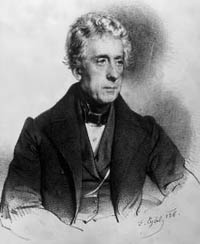Johann Philipp Neumann: Difference between revisions
m dab |
added Category:Austrian physicists using HotCat |
||
| Line 31: | Line 31: | ||
[[Category:19th-century Austrian people]] |
[[Category:19th-century Austrian people]] |
||
[[Category:Franz Schubert]] |
[[Category:Franz Schubert]] |
||
[[Category:Austrian physicists]] |
|||
[[de:Johann Philipp Neumann]] |
[[de:Johann Philipp Neumann]] |
||
Revision as of 18:56, 15 March 2013

Johann Philipp Neumann (27 December 1774 – 3 October 1849) was an Austrian physicist, librarian and poet.
Born in Trebitsch in Moravia, he completed his studies at the University of Vienna. In 1803, he was appointed as a professor of physics at his local lyceum. He was transferred to the University of Graz in 1806, where he became a rector in 1811.
In 1815, he was appointed as a professor at the Polytechnic Institute in Vienna (now the Vienna University of Technology). He founded a library here in 1816, which he directed until 1845.
Neumann was a friend of the composer Franz Schubert.[1] Neumann adapted Georg Forster's translation of Shakuntala as a libretto for an opera, which Schubert commenced but never competed.[2] Neumann, a liberal-minded churchman, was interested in simple music designed to appeal to "the widest possible congregation".[2] To this end, he wrote the text of 8 hymns and a translation of the Lord's Prayer, and commissioned the Deutsche Messe from his friend in 1826.
He retired in 1844, and died in Vienna in 1849.
References
- ^ Glover, Raymond F., ed. (1990). The Hymnal 1981 Companion. p. 71.
- ^ a b Newbould, Brian (1999). Schubert: The Music and the Man. p. 140.
